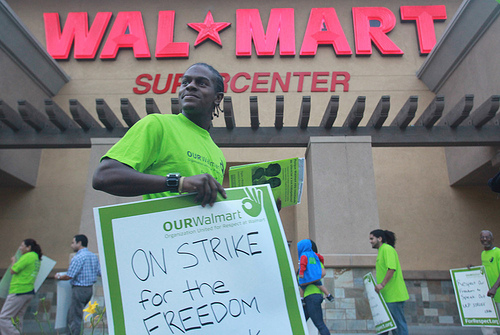Red Friday

(UFCW International Union / flickr)
The holiday season is upon us, and if you’re a Jacobin reader, you probably don’t have firm plans for Black Friday, the largest, most soul-crushing shopping day of the year. Maybe, if you’re still with your family, you’ll strike up the annual argument with your libertarian uncle.
Or maybe you’ll catch some news footage of stampeding hordes of predawn shoppers all but foaming at the mouth for a sale and pause to reflect on the madness of American consumerism.
But while hunkering down far from the frenzied masses might seem best for your mental and spiritual health, dare I suggest that you seek them out. Not for sweet bargains on a plasma television, but to join one of the nearly 1,000 daylong strikes against the largest private employer in the world.
Earlier this year, seemingly out of nowhere, workers at Walmart stores and warehouses went on strike. The retail workers walked off the job at dozens of stores around the country for brief periods of time before returning to work; warehouse workers in key distribution centers struck for longer, sometimes over a month.
Both groups told tales of erratic scheduling, nonexistent benefits, dependence on government assistance like food stamps, retaliation against workers who were organizing, and poverty wages — complaints long made by Walmart employees. Neither groups were officially represented by unions.
Walmart employs over two million workers in nearly 9,000 stores worldwide, about half of which are in the United States. The company took in $15.7 billion in profits last year, and six members of the Walton family have a combined worth of about $93 billion, and have a net worth equaling the bottom 30 percent of all Americans.
It is also the pacesetter in global retail and logistics, making the company a mandatory organizing target for the labor movement.
The United Food and Commercial Workers union (UFCW) has made multiple attempts to organize retail workers in recent years without much to show for it. No Walmart store has ever been successfully organized in the United States. (Workers formed unions at three in Canada — Walmart promptly closed one.)
This is partially due to the company’s notoriously and unapologetically vicious union-busting strategy, and also because of a past strategic misreading of where the company is most economically vulnerable to disruptive organizing: not in its retail operations, but in its massive logistics operations, which labor historian Nelson Lichtenstein calls a “mass sweatshop.” “The industry is the supply chain,” he says.
This is why Organization United for Respect at Walmart (OUR Walmart) has coordinated its retail organizing efforts with other organizing workers in the company’s supply chain — in gargantuan warehouses in California, New Jersey, and suburban Chicago. These are the pipelines through which astounding quantities of imported goods pass through the hands of a workforce composed almost solely of temp workers (or “permatemps,” as many workers toil for years without ever becoming full-time) earning at or near minimum wage for physically demanding work.
Warehouse workers in Elwood, Illinois, at the key node in Walmart’s national distribution system struck in September. Incredibly, the thirty workers won all of their demands — after shutting down the warehouse for the day with a march and civil disobedience action, costing Walmart an estimated $8 million. Earlier in the month, California warehouse workers walked off the job and marched for six days from the massive “Inland Empire” of warehouse complexes to Los Angeles’s City Hall.
At the same time, retail workers in more than a dozen cities have walked off the job in rolling, temporary strikes. They also represent the first time workers at Walmart stores have ever engaged in concerted strikes — strikes which will reach their peak on Black Friday.
These unorthodox tactics — “minority unionism,” where unions or other labor organizations organize and agitate with a minority of workers to push for changes without formally representing workers, and unfair labor practice strikes, which carry a high chance of failure — are rarely used in the labor movement these days. They require workers to take enormous risks without the formal legal protection of union representation.
It’s possible that the current round of Walmart organizing will, despite its tactical shrewdness, net nothing — another high-stakes failure of a labor movement practically comfortable with losing. But it’s also possible that Walmart workers will wring significant concessions out of the company and make steps towards unionization in the long-term. This campaign is certainly the most promising effort to take on Walmart, and workers have already won several victories.
Simply, labor has no choice but to organize Walmart. Leaving the company union-free would continue to cede the setting of national and global labor standards to the whims of a particularly rapacious representative of international capital.
This might not be the Thanksgiving you’ll win over your Ayn Rand-worshiping uncle, but there’s plenty more useful things to do. Class struggle will be alive in America tomorrow. Join it.
- For a listing of all Black Friday actions in the US, click here.
- To donate to a fund for striking workers, click here.
- For breaking updates on Walmart organizing, see labor journalist Josh Eidelson’s blog on Walmart worker organizing at the Nation and follow him on Twitter.